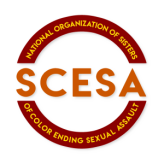Lauren H. Collins is a board certified physical therapist and certified lymphedema therapist. She has practiced physical therapy for 20 years with an emphasis in women’s health for the past 16 years, inclusive of pelvic floor dysfunction for the past 10 years. She (www.facebook.com/VitalSelfPhysicalTherapy/) has specialized training in Craniosacral therapy, Visceral manipulation and Myofascial Release as part of her manual therapy skills.
Lauren believes in multilayer healing and incorporates a philosophy of whole self-healing in her treatments. She is a trained sexual assault crisis first responder and has special interest areas in working with survivors of sexual assault and domestic violence as well as issues around cultural relevancy. Lauren provides multifaceted workshops and training sessions to survivors as well as those organizations that support survivors on healing chronic pain and pelvic floor dysfunction issues.
IN HER OWN WORDS
We asked our Sheroes some questions, here’s what Lauren had to say:
“There is a trust between someone who has been through what you have been through and understands the community and culture that you come from.”
How did you come to doing sexual assault work?
I came to do this work because I grew up with a mother, Umi Hankins, who was and is very active as an activist for survivors of domestic violence. As a teenager, I would go to shelters and conferences with my mother and learn about advocacy and fighting for the rights of survivors. As I became a pelvic health physical therapist, I noticed the correlation between the number of women that I treated for various pelvic pain and other chronic pain diagnoses and those women being survivors of sexual trauma. I also realized that at the numerous conferences I had attended, there was no one [present] speaking on the physical healing after sexual trauma. I felt like this was an area that needed to be addressed when speaking of healing for survivors.
Why do you think addressing sexual assault is important?
I think addressing sexual assault is important because it can profoundly affect the lives of women and men in all aspects, physically, psychologically,and spiritually. I have treated numerous individuals who have not been able to have healthy sex lives, or have bowel or bladder issues, depression, anxiety, low self-esteem and numerous other issues as a result of a history of sexual assault.
People need to heal from sexual trauma as best they can and if the trauma is not addressed that cannot happen. I also think addressing sexual assault is important because it is used as a tool to undermine and control women. It needs to be addressed to protect the rights and safety of women.
Why is it important for Communities of Color to address sexual assault in their community?
It is important for communities of color to address sexual assault in our communities because there is a shared understanding of history (historical trauma) and culture and spirituality. There is a trust between someone who has been through what you have been through and understands the community and the culture that you come from. Everything from common histories, to common language and understanding, to common struggles.
How do you think your work impacts or makes a difference in ending sexual assault?
My work [helps] women find a new strength and awareness in their bodies. I think it impacts a women’s reclamation of her body and not allowing the person who committed the assault to have control over her body. With finding her strength, awareness and reclamation of her body, the survivor helps end the cycle of abuse within herself.
What are some of the lessons you have learned about addressing sexual assault?
Everyone does not respond the same way. Everyone is not ready to address their healing at the same time. They have to be able to be in a place to allow themselves to be vulnerable to heal. When someone is going through other life issues you have to be able to meet them where they are, as they are able.
Do you have a Women of Color that inspires you? Why does this person inspire you?
[The person] who inspires me is my mother, Umi Hankins. She is my Shero because she is phenomenal. She co-founded the Institute on Domestic Violence in the African American Community (IDVAAC); has worked on policy, has been an advocate for Black women survivors of domestic violence, has educated hundreds to potentially thousands of people. She is an Amazing Mother, daughter, sister, Grand-Mother and Auntie!
